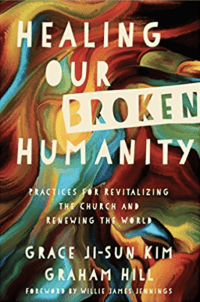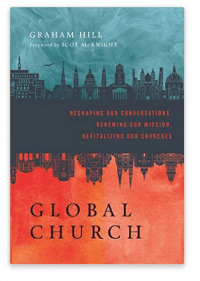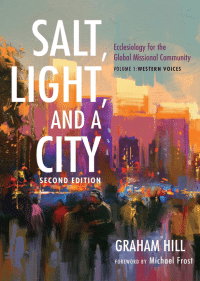Here’s the secret to revival, and to the renewal of the church and world

Here’s the secret to revival, and to the renewal of the church and world
The secret to revival is not what you are thinking
We are living in a broken world. Families are struggling. Addictions are rising. Immorality is increasing. Racism and sexism abound. Royal Commissions uncover shocking corruption, abuse of power, and exploitation of the most vulnerable. This a broken world, full of conflict, pain, fear, immorality, and injustice.
The Billy Graham worldwide crusades in the 1960s and 1970s were perhaps the closest many countries have ever come to a revival. Take Australia, for instance. In 1959 alone, more than 130,000 Australians made a commitment to Christ. The social affects were astonishing, including drops in alcohol consumption and crime. Thousands of people responded to the call of God to plant churches, go to the mission field, and train for Christian ministry.
The secret to revival is practices that enable the church to truly share the love and gospel of Jesus Christ.
We need another move of God in South Korea, Australia, North America, and throughout the globe. Crusades are valuable and worthwhile; I will never talk down how God has used them in the past and may, by his grace and power, use them again. I pray that people will come to a saving faith in Jesus Christ by all means possible.
But the secret to revival isn’t crusades. The secret to revival is practices that enable the church to truly share the love and gospel of Jesus Christ.
Revival happens when Christians pursue practices that bring healing and hope to a broken world. These practices include developing a lifestyle of prayer, living as daily witnesses to God’s grace and love, welcoming strangers to our homes and tables, being repentant and humble, living with integrity and protecting the weak and the vulnerable, and loving our neighbours and communities. This means being the kinds of loving and holy and peacemaking fellowships that people want to be a part of. These practices mean living out the gospel of Jesus Christ with great passion and humility, and expressing that in our peace, justice, reconciliation, truthfulness, compassion, welcome, and life together.
Transforming practices revive our churches and society
I grew up in a suburb and family full of craftspeople and tradespeople. These were people skilled in a range of functional, decorative, or specialized crafts and trades. These included carpenters, tailors, stonemasons, builders, bricklayers, and electricians. It included floorers, landscapers, plumbers, roofers, welders, truck drivers, automotive mechanics, architects, and cabinetmakers. Each plied their craft with skill. They made commitments to apprenticing one, two, or three others in their craft or trade. Each honed their expertise. They saw their craft or trade in the light of the broader community of artisans. They worked together, building or renovating houses, sculpting landscapes, restoring automobiles, or fashioning garments or pieces of furniture.
I learned the importance of discipline and practice, both personal and in community.
The finished product was rarely the result of one craft or one artisan working alone. At times, these tradespeople or craftspeople were only skilled in one area. But, often, they were multi skilled: carpenter-floorers, plumber-electricians, architect-landscapers, truckie-mechanics, or teacher-builder-electricians. My father restored houses from time to time—including my own house, after my wife Felicity and I moved to Sydney, Australia. When he did this, he used an array of carpentry, electrical, plumbing, construction, architectural, roofing, flooring, and landscaping skills. And he called on the skills of others he trusted.
In that environment, I learned the importance of discipline and practice: both personal and in community.
A person becomes a highly skilled craftsperson or tradesperson (or dancer, musician, theologian, pastor, writer, etc.) through many years of hard work and personal discipline. This person, and the community they are a part of, performs important, disciplined practices countless times, over many years. These practices form them personally, build their life together, and shape the fruit of their lives and shared efforts. This is a community of discipline. It is a practicing community. These practices shape their life together, and often lead to extraordinary and beautiful results.
[bctt tweet=”The church will only see revival when it pursues transforming practices that revitalise the church & renew the world.” username=”GrahamJGHill”]
My co-author of my new book, Healing Our Broken Humanity, Grace Ji-Sun Kim, has a teenage daughter, Elisabeth, who’s an example of the power of disciplines and practices. Elisabeth has been taking ballet lessons since she was three years old. When she turned eight, her dance became more and more serious and she had to focus and become a disciplined dancer. She goes to ballet 4-7 days a week. When there are performances like The Nutcracker or Spring Dance performance, she will be at her ballet studio for 3-5 hours a day to warm up, stretch, rehearse, and learn new routines. It takes skill to dance, but also lots and lots of practice to become a good dancer.
After hundreds of repetitions and practices of the same movement, the students come to learn the move.
Elisabeth takes her classes and rehearsals very seriously. In class, the dancers are not allowed to talk unless the instructor asks them a question. It is a strict class where the dancers are expected to quietly follow directions and practice the new moves. There is a lot of repetition as the instructor makes them do it over and over again until they have mastered it. The teacher will point out what they are doing right or wrong and then also do a hands-on approach to lift or stretch their legs or arms in a correct manner. After hundreds of repetitions and practices of the same movement, the students come to learn the move.
Furthermore, after Elisabeth’s dance classes and rehearsals, she will go home and do her homework and study for her tests. Then before bed, she will spend another thirty minutes, stretching and exercising before she goes to bed. She is also very careful about what she eats. She will do her best to stay away from fatty foods and eat fresh fruits and vegetables. She avoids junk food and processed food as she recognizes that a healthy body is needed to be a serious dancer.
These practices are crucial to becoming a dancer. They have become part of her lifestyle. Her classes, routines, rehearsals, and healthy lifestyle are all practices that are essential forms of discipline needed to be a serious dancer.
For the rest of us, whether we want to become a dancer or a faithful disciple of Christ, we need to engage in life-giving and transforming practices.
The church will only see revival when it pursues transforming practices that revitalise the church and renew the world.
American theologian Stanley Hauerwas makes this point strongly by drawing on the metaphor of bricklaying. He says the church needs to learn to lay metaphorical bricks and to make disciples. Learning to lay bricks involves “learning a myriad skills, but also a language that forms and is formed by those skills.”[1] It’s about learning the craft from those who’ve gone before. It isn’t primarily about crusades or being relevant or learning more Bible and theology. This is about practices shaped through discipline, love, faith, patience, character, and community.
This is how the church makes disciples and sees revival: through life-giving and gospel-honouring practices.
Nine transforming practices that bring revival, and that renew the church and the world
I first became passionate about nine transforming practices covered in my new book Healing Our Broken Humanity in the late 1990’s (my new book is co-authored with Grace Ji-Sun Kim). I was speaking at a conference in Manila in the Philippines. I was staying in a backpacker’s hostel at night, and speaking at conference sessions during the days.
One morning, I was woken by the sound of sobbing. I looked down from my bunk to see an elderly man sobbing beside his bed. During the week, I got to know this remarkable man. He was an elderly Vietnamese pastor, who’d planted a church of a dozen people in his home thirty years earlier. That church had grown to tens of thousands of people. He told me stories from this Vietnamese church that sounded like something from the book of Acts. These were stories of miracles, lives transformed, persecution, and a growing, vibrant, underground church in communist Vietnam.
I started wondering about the thousands and thousands of stories that are never heard.
But during the week I noticed something. All the speakers at the conference in Manila looked like me – white men. So, I started thinking about the injustice of this. Why weren’t people like my elderly Vietnamese friend asked to speak, or at least to tell their stories? I started wondering about the thousands and thousands of stories that are never heard: Christians whose voices are ignored, silenced, or marginalized. How do we start to hear these voices? How do we hear their cries for (and stories) of justice, peace, hope, and reconciliation?
These nine practices include repenting together, rediscovering prayer, renewing lament, restoring justice, reactivating hospitality and reconciling relationships.
I also started wondering how do we learn from Christians where the church is growing and thriving? What do they teach us about new habits and practices that transform the world? How will these practices heal our broken world?
That was the beginning of my journey. These nine practices in our new book Healing Our Broken Humanity come out of listening to thousands of Christians from all over the world talk about the practices that they know bring revival and renewal, and heal our broken world. These nine practices include repenting together, rediscovering prayer, renewing lament, restoring justice, reactivating hospitality, reconciling relationships, and more.
Our churches need new, transforming practices that revitalize the church and its mission, and that transform the world.
To learn more about these nine practices, please buy my new book HERE.
Eternity News에 처음 게시 됨, HERE
Image Credit: Jinhae Cherry Blossom Festival: I am on the road
또한이블로그게시물을참조하십시오.
속죄와치유: 십자가에서의예수님의죽음이육체적질병의치유를보장하는가?
그들은성장하고있습니다. 그들은번영하고있습니다. 그들은세계교회의미래를형성하고있습니다. 이제그들의목소리에귀기울일때입니다.
블로그 구독 신청
전 세계 기독교 지도자들의 블로그, 인터뷰 비디오 및 팟 캐스트를 무료로 제공합니다.
아래 링크를 통해 구독해 주세요: http://eepurl.com/b9VKSX
Graham Hill
Graham Hill (PhD) teaches pastoral studies and applied theology at Morling College in Sydney, Australia. He is the Founding Director of The GlobalChurch Project – www.theglobalchurchproject.com. Graham has written 6 books. His latest three books are “GlobalChurch: Reshaping Our Conversations, Renewing Our Mission, Revitalizing Our Churches” (InterVarsity Press, 2016), “Salt, Light, and a City, Second Edition: Ecclesiology for the Global Missional Community: Volume 1, Western Voices” (Cascade, 2017), and a co-authored book with Grace Ji-Sun Kim called “Healing Our Broken Humanity: Practices for Revitalizing the Church and Renewing the World” (InterVarsity Press, 2018)
© 2016 All rights reserved. Copying and republishing this article on other Web sites, or in any other place, without written permission is prohibited.
Want to be mentored?
Books
Don’t forget to buy Graham Hill’s books:
- Global Church
- Salt, Light, and a City (second edition)
- Healing Our Broken Humanity



Comments: We’d love to hear your comments and reflections on this blog post!





